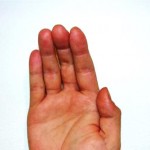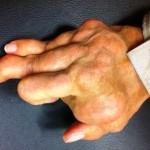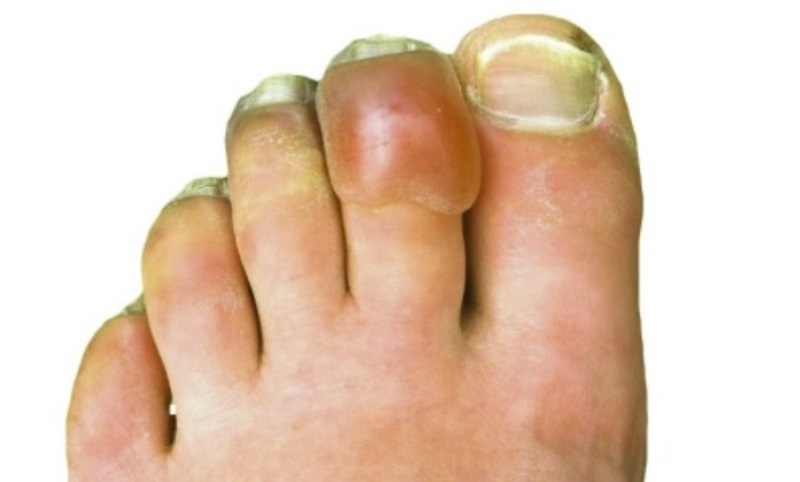Knee pain is a common ailment that occurs as a result of constant wear and tear of the knee joint. Although the condition usually afflicts older adults, it is not uncommon in young men and women and even, children. The exact origin of the pain can vary, depending on whether the pain arises in any of the three bones that makes the knee joint (femur, tibia and fibula) or the kneecap (patella) or the ligament and cartilage. Also, the pain could be localized or diffuse through the leg, depending on the affliction.
Suggested read: All you need to know about how to reduce fever with home remedies
The severity of the pain could range from a minor discomfort to a debilitating ache that overwhelms one to the point of immobility. While old age is one of the most common reasons to develop the condition, knee pain could also be caused by weakened bone structures, wear and tear, injuries, fractures, dislocation of knee joint, stiffness owing to arthritis, lupus and/or other chronic conditions. The pain may be accompanied by stiffness, redness, swelling, numbness and/or difficulty in walking or standing.

Image source: healthline
Knee pain is a serious condition and could be more than just an outcome of rigorous exercise. It is advisable that you consult a doctor for apt diagnosis and treatment instead of turning to home remedies for knee pain. You could, however, use home remedies for knee pain in conjunction with prescribed drugs to avail significant results. These home remedies for knee pain work for mild to moderate knee pain conditions but are also useful in chronic ailments like arthritis. Here are a few you could use for maximum benefit:
1. Cold compress
Using a cold compress to alleviate knee pain is an oft-used trick in the book. The cold constricts the blood vessels, reducing the blood flow to the region, reducing swelling and bringing instant relief. You could create a compress out of ice cubes yourself, use readily available ones or even use a bag of frozen peas for alleviating the pain. Doing this in 10-20 minute sessions twice daily shall show significant improvement. You could also opt for alternating between hot and cold treatments for maximizing results in case of chronic pain.
2. Apple cider vinegar

Image source: Google, copyright-free image under Creative Commons License
The alkaline nature of apple cider vinegar helps in dissolving mineral build-up and harmful toxins in the knee, thereby helping to restore normal functionality. Also, it helps to bolster the effect of joint lubricant to promote mobility by washing out the pain. You could either add 2tbsp of apple cider vinegar to 2 cups of water and consume the mixture twice regularly until you begin to see noticeable signs of improvement or soak yourself in a hot bath with two cups of apple cider vinegar added in, to achieve visible results. Alternatively, you could use a mixture of apple cider vinegar and olive oil to massage the affected area twice regularly until the pain is gone.
3. Cayenne pepper
The capsaicin in cayenne pepper acts as a pain reliever and its analgesic properties help in alleviating pain by furnishing warmth to the affected region. You could add 2 tbsp of cayenne pepper to half a cup of olive oil to create a fine paste that you can apply to the affected region and leave on for a couple of hours before rinsing it off. You could also use a mixture of 1 tbsp cayenne pepper in a cup of apple cider vinegar to create a solution that you can soak your knee in for about 20 minutes twice every day until you begin to see improvement. Pharmacies have readily available capsaicin gel ointments that you can apply directly to the affected area.
4. Ginger
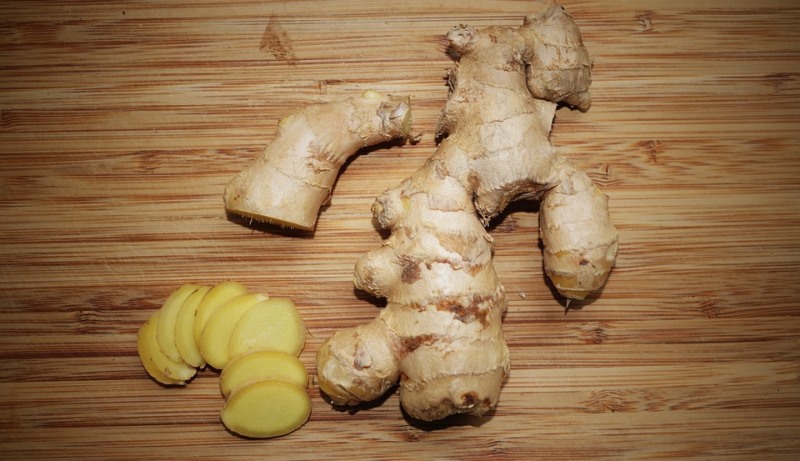
Image source: Pixabay, under Creative Commons License
Ginger can alleviate knee pain owing to its anti-inflammatory properties that brings down the swelling and washes out the pain. You could either brew ginger tea by adding a piece of crushed ginger to water brought to boil, steeping and straining the solution and adding a few drops of honey and lemon juice to it for a 3-time daily consumption or massage the affected region with ginger oil twice during the day to attain remarkable results.
Suggested read: 10 home remedies that will help you cure high blood pressure
5. Turmeric
Curcumin in turmeric has strong antioxidant and anti-inflammatory properties that relieve knee pain. In fact, the National Center for Complementary and Alternative Medicine has relayed that turmeric may be instrumental in slowing down the progression of rheumatoid arthritis. You could either add turmeric to ginger tea or simply, mix a teaspoon of turmeric to a glass of warm milk, sweetened with honey to for daily consumption. You could also accompany this with a turmeric paste made in olive oil to be used on the affected area regularly. Please note that turmeric treatment isn’t recommended for those taking blood-thinning medication.
6. Lemon
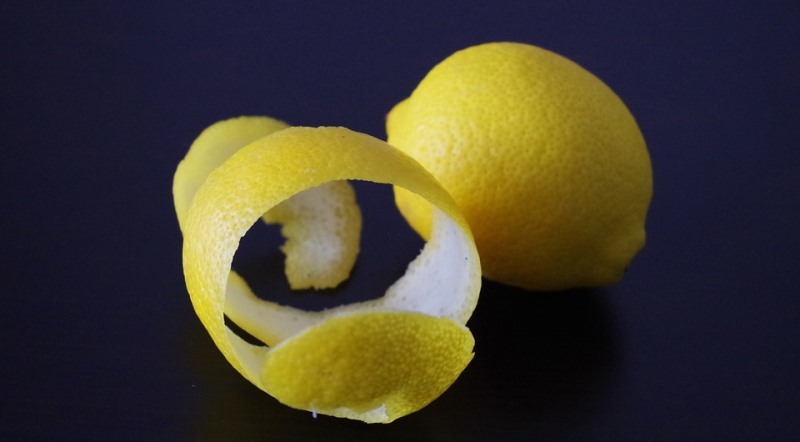
Image source: Pixabay, under Creative Commons License
The citric acid in lemon has been proven to be an effective solvent for uric acid crystals that are known to be the cause of specific kinds of arthritic conditions. You can slice lemons and tie them up in a cloth to be dipped in warm sesame oil. You can then place the cloth on the affected region for about 10-20 minutes, gently applying pressure on the cloth for the essence to percolate. Follow the method twice every day to see significant improvement. Drinking the juice of a lemon in a glass of warm water on an empty stomach early morning can prove immensely beneficial.
7. Mustard oil
Ayurvedic studies have evinced that a gentle massage of the affected area with warm mustard oil can help improve blood circulation, reduce swelling and alleviate pain. Heat two tablespoons of mustard oil, throw in a garlic clove and dry until turns brown. Cool and strain the oil. Use the oil to massage your knee in drawn out circular motions for 10-15 minutes. Cover the knee with plastic wrap and use warm towels to supply heat. Do this twice daily to achieve significant results.
8. Epsom salt
The magnesium sulphate content in Epsom salt has been proven to deliver relief from knee pain. Magnesium works as a natural muscle relaxant that helps to remove excess fluid from the tissues, in turn reducing inflammation, swelling and pain. Add half a cup of Epsom salt to a hot water bath and soak in it for 15 minutes. Repeat the process a few times in the week to begin to see noticeable improvement. This treatment isn’t recommended for those suffering from heart ailments, blood pressure problems and/or diabetes.
9. Fenugreek seeds
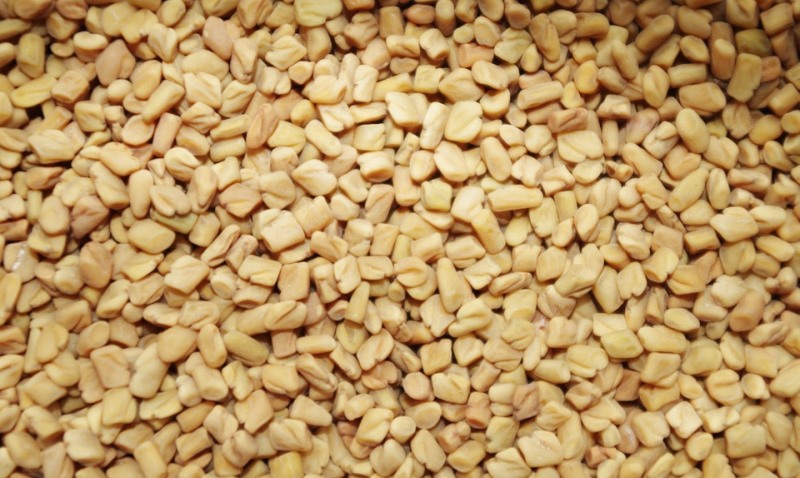
Image source: Google, copyright-free image under Creative Commons License
Fenugreek seeds are known to relieve knee pain owing to their anti-inflammatory and anti-oxidant properties. You could either consume soaked fenugreek seeds every morning or roast and grind the seeds to make a thick paste for applying to the affected area. Leave the paste on for half an hour before rinsing it off. Using the remedy twice a week shall help to overcome the pain.
Suggested read: 13 super amazing home remedies for acne scars for flawless skin
10. Eucalyptus oil
The analgesic, pain-relieving properties of Eucalyptus oil can help reduce the pain. You could blend equal quantities of Eucalyptus and peppermint oil, add 2tbsp of olive oil and use the mixture rub into your knees, when they ache. You need to massage gently in easy, circular motions in order to derive maximum benefit.
Happy knees!
Featured image source: healthline




